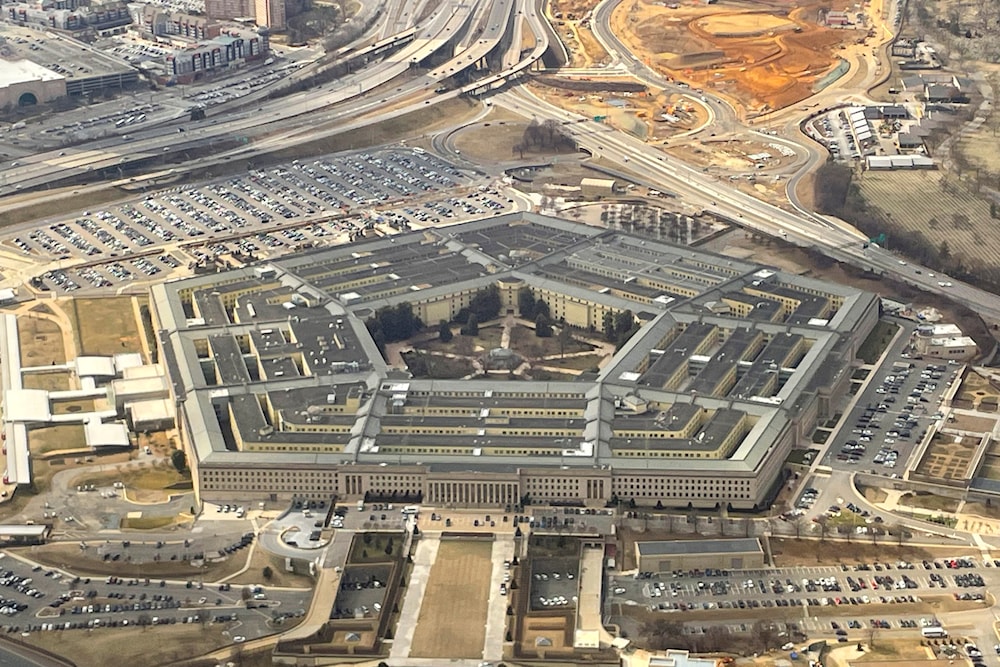Trump pushes for mineral refining on Pentagon bases: Reuters
Donald Trump plans metal refining facilities on Pentagon bases to boost US critical mineral production and reduce reliance on China.
-

The Pentagon is seen in this aerial view through an airplane window in Washington on February 20, 2025. (AP)
Reuters reported on Tuesday that US President Trump is set to establish metal refining facilities on Pentagon military bases to boost US production of critical minerals and reduce dependence on China, according to senior officials.
This initiative is part of an executive order that Trump may sign soon, following his announcement to Congress that he will "take historic action to dramatically expand production of critical minerals and rare earths here in the USA."
The Pentagon would collaborate with other agencies to set up processing facilities, emphasizing the national security importance of critical minerals used in military equipment. Additionally, Trump plans to appoint a "critical minerals czar" to oversee these efforts. The plans are still under discussion and may change before the order is signed.
Concerns were raised among some administration officials about the possibility of China restricting critical mineral exports in retaliation for US tariffs or other factors. The US National Security Council did not comment on the issue.
Read next: Trump's tariffs mark a shift toward protectionism: WSJ
According to Reuters, the plan would take advantage of the Pentagon’s control over approximately 30 million acres of land, providing space for the refining facilities without the need to purchase land from other federal departments or cause local controversies.
While the focus of the plan is on increasing metals processing capacity rather than reforming US mine permitting, it may upset US miners but aims to address manufacturers' concerns about China's dominance in the global metals processing sector. China controls a significant portion of critical minerals needed by the US.
Regulatory challenges in Trump’s critical minerals plan
According to the report, it is still unclear how Trump’s proposal to build processing facilities on Pentagon bases will comply with existing regulations, such as the Clean Air Act and Clean Water Act, which have historically slowed private development of such projects.
According to Reuters, Trump has shown a willingness to consider alternative uses of federal land, such as pledging to open areas for large-scale housing with "ultra-low tax and ultra-low regulation" zones during his presidential campaign.
He does not plan to create a US critical minerals stockpile like the Strategic Petroleum Reserve, despite some calls for this from the administration and mining industry. While China stockpiles minerals like cobalt, the US government has considered stockpiling cobalt due to its use in critical technologies like missiles, aerospace parts, and radar systems.
Read next: Trump's push for Ukraine's rare earth elements explained
The executive order will not include a "Buy American" mandate requiring US agencies to use only domestic minerals, despite advocacy from junior miners. It will also not attempt to alter the federal mine permitting process, which is governed by the 1970 National Environmental Policy Act. However, the order aims to expand the FAST-41 permitting process, initiated during Trump’s first term, to accelerate the approval of critical mineral projects.
Additionally, the order may push for the reclassification of mine waste on federal land, a move already taken by companies like Rio Tinto and Freeport-McMoRan. This would allow the extraction of valuable minerals from previously discarded materials, potentially reducing costs and time compared to building new mines.
According to Reuters, it remains uncertain if Trump plans to designate copper as a strategic mineral, which could offer US copper miners a 10% production tax credit. Freeport, the largest US copper miner, has expressed hope as such a designation would save the company $500 million annually.

 4 Min Read
4 Min Read








